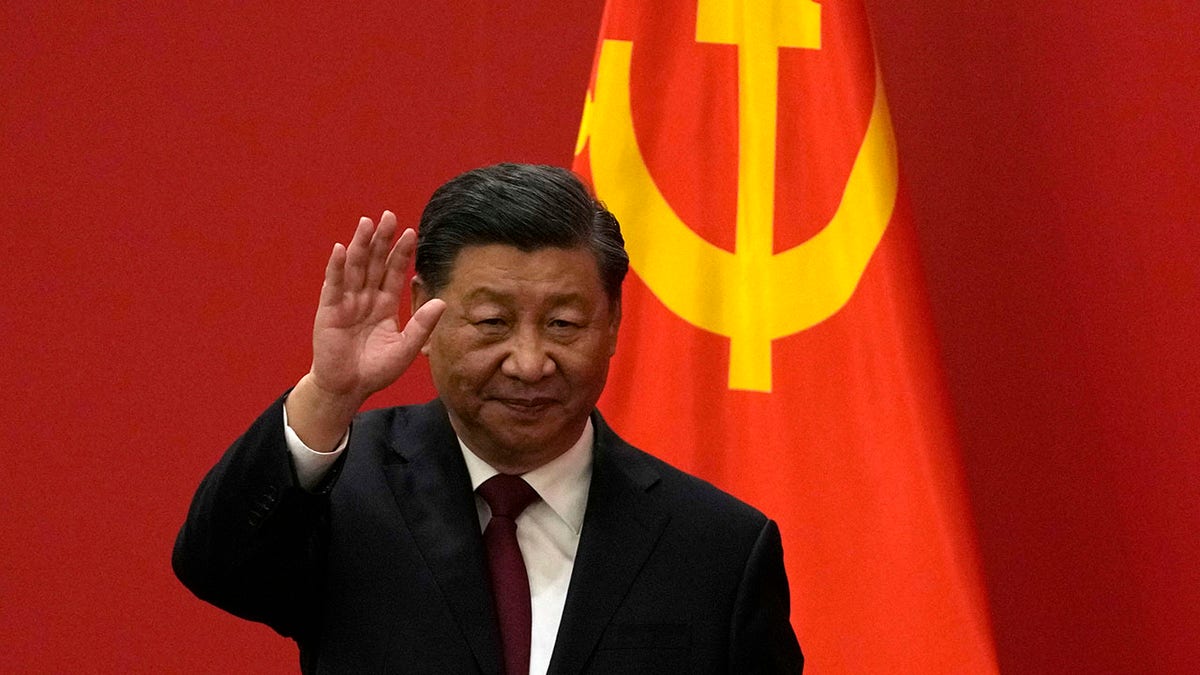China could hack into US satellites, Biden security programs: Docs leak
House Intelligence Committee member Rep. Brian Fitzpatrick, R-Penn., tells Arthel Neville on ‘Fox News Live’ that ‘there is nothing’ the Chinese Communist Party will not do to ‘get a leg up’ on the world.
China has ramped up its efforts to clamp down on foreign data procurement in a move partially motivated by U.S. think tank efforts to monitor hard to find information on Beijing and its "military-civil fusion" strategy, a report by the Wall Street Journal found Monday.
As tension and competition between the U.S. and China continues to mount, Beijing has recently taken steps to restrict overseas access to its databases and tighten its control over Western narratives relating to China.
An espionage act revised late last month has drawn concern from the international business community, which has argued that the new guidelines could make continuing business with the world’s second-largest economy more risky.

Chinese President Xi Jinping waves during an event at the Great Hall of the People in Beijing on Oct. 23, 2022. (AP Photo/Andy Wong, File)
CHINA'S SURPRISING INTELLIGENCE OPERATIONS TAKE FOCUS FOLLOWING 'WATERSHED' SPY FLIGHT
Western consulting, legal, cyber and auditing firms may find it harder to conduct business with Beijing following President Xi Jinping’s move to expand China’s power over private entities and control access to data and financial records.
But according to anonymous sources familiar with Beijing’s efforts, the increased restrictions are apparently due to mounting concern among top Chinese officials over the intelligence that U.S. analysts have been able to garner by using publicly available information.
China’s push toward a "military-civil fusion" – which the State Department describes as "aggressive" – has been of particular interest to U.S. think tanks.
The department has detailed the Chinese strategy as a ploy to remove "barriers between China's civilian research and commercial sectors, and its military and defense industrial sectors" in a move to enhance its "People’s Liberation Army (PLA) into a ‘world-class military’ by 2049."
But Beijing’s military integration of the commercial sector does not only utilize its own private sphere.

New recruits of Chinese People's Liberation Army attend a sendoff ceremony at a railway station in Ganzhou, Jiangxi province, March 16, 2023. (China Daily via Reuters)
China’s notoriously ambiguous policies toward private foreign companies and its possible access to entity intel have long concerned Western officials – prompting U.S. think tanks and analysts to scour publicly available information for answers.
One June 2022 report by the Center for Security and Emerging Technology titled "Silicon Twist" apparently struck Chinese officials as particularly concerning as it focused on how China’s military was accessing "advanced chips" produced by private American companies in Taiwan and South Korea, sources told the Wall Street Journal.
Analysts were reportedly able to detail how the PLA has gained access to these chips after viewing thousands of publicly available purchasing records and financial data.
The information that these think tanks are able to acquire has been utilized by U.S. lawmakers when it comes to implementing Washington’s security and trade policies with Beijing.

A person rides a bicycle past a giant screen broadcasting news footage of Chinese ships participating in "Joint Sword" exercises around Taiwan, in Beijing, April 8, 2023. (Reuters/Tingshu Wang)
CLICK HERE TO GET THE FOX NEWS APP
Findings by the Center for a New American Security have also reportedly been used in testimony presented to one congressional group, dubbed the U.S.-China Economic and Security Review Commission, on Beijing’s military use of artificial intelligence to bolster its combat abilities.
But as Beijing continues to limit access to data and financial information, analysts and investors alike are increasingly concerned by the even greater potential there is for an ambiguous future when it comes to the U.S.’s economic and policy-based relationship with China.
Isaac Stone Fish, CEO of Strategy Risks, a China-focused risk firm, told Fox News Digital, "Beijing wants companies to increasingly work with the Chinese Communist Party, while Washington wants them to reduce their exposure to the Party. It’s a major decision every large American company needs to make: companies can no longer sit on the sidelines.
"They have to lean one way or the other. They also have to understand that both Beijing and Washington want them to choose," he added.








































